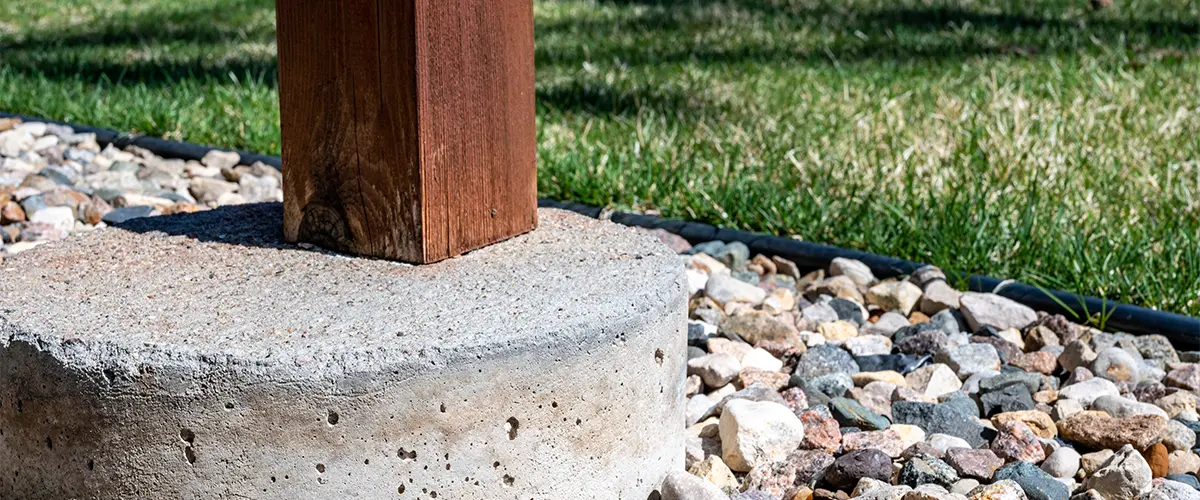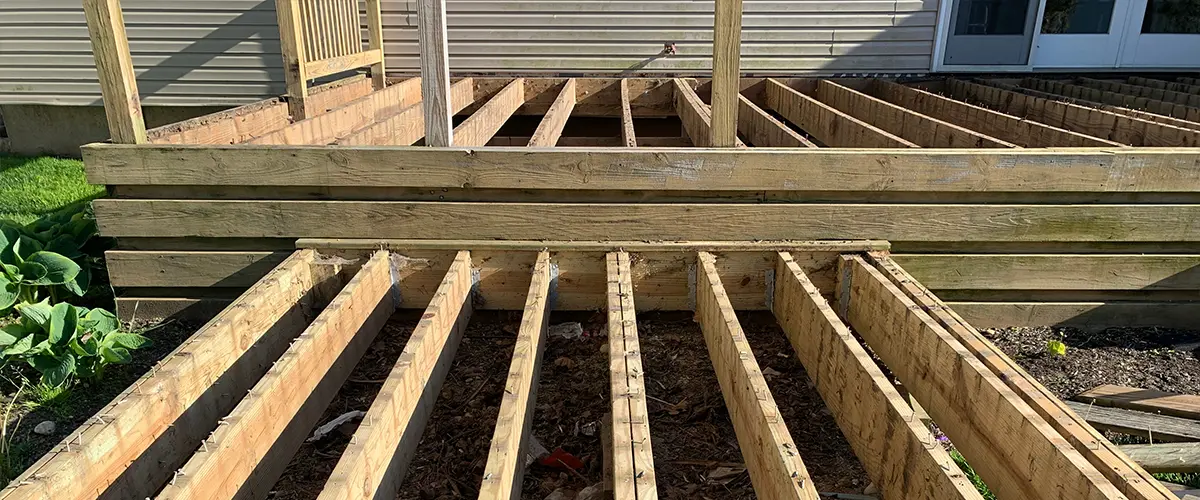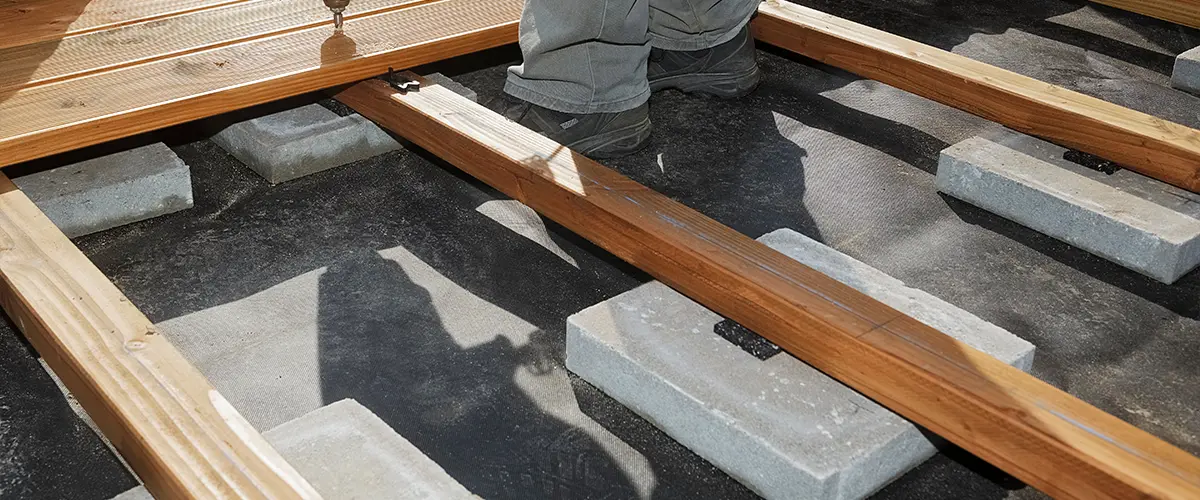We already talked about deck blocks, what they are, and how they help your deck. But what if we tell you there’s an even better option that ensures your deck is 100% safe, functional, and also boosts its aesthetics?
Although deck footings are a little more expensive and require more work, these are incredibly efficient footings that will give your deck construction a clean and seamless appearance.
While Fortress Building Products offer the best metal frames that don’t need any deck footings, most decks will need them.
Let’s talk more about deck footings and discover everything there is to know about these beautiful features worthy of any outdoor space.

What Are Deck Footings
Deck footings are a type of footing used to secure the deck posts to a hole in the ground filled with concrete. These concrete footings come in a variety of shapes, styles, and sizes to accommodate different designs home styles.
Deck footings provide a secure foundation for your deck, and help to distribute the weight of the deck evenly across the surface of the ground. This prevents the deck from sinking or shifting, and ensures that it is stable and safe.
Cost Of Poured Concrete Deck Footings
The cost of pouring concrete footings depends on the dimensions of the footing your deck needs. For example, a 12” diameter footing usually requires 120lb bags of concrete per foot of depth.
- Bags of concrete can vary in price but start at around $3.50 for a 60lb bag.
- A cardboard tube to pour the concrete in will cost around $4 per linear foot.
- If you're not dropping the wood post in concrete, you'll need metal brackets to attach them. These cost around $10 per footing.
For just one concrete footing that’s 4ft deep and 12″ in diameter, it’ll cost you between $50 to $60, without labor. Pouring concrete is a tough chore that also requires tools and knowledge, so add another $200 to $400 labor cost per footing.
If you want to save money on deck footings, you can opt in for the buried post footings. These require fewer materials, time, and labor.

Types Of Deck Footings
There are a variety of different types of deck footings available, including helical pier footings, H-pile footings, and floating pier footings.
Each type has its own advantages and disadvantages, so it is important to choose the right footing for your specific deck design.
Let’s discuss more about each of these deck footing options.
Precast Stackable Cement Deck Footings
Instead of pouring the concrete footing, you’ll buy the stackable cement footings already made, and all you’ll have to do is stack them in the footing holes until you create a strong and reliable foundation.
Precast cement blocks are a more expensive material, so you’ll spend more than pouring your own concrete. Besides, the materials themselves are heavy, making transportation and handling them a real chore. However, if you choose poured concrete footings, you’ll have a lot more work to do.
Buried Post Footings
Buries post footings are one of the most popular options because of how durable and easy to install they are.
The buried post footing implies digging below the frost line, pouring the concrete mix, and then securing the post in the not-yet-dried concrete. The process requires less materials and work, which is a huge advantage.
Helical Pier Footings
If you are looking for an extremely durable and strong footing option, helical pier footings may be a better option for you. Helical piers are pre-cast concrete piers that feature a helical screw anchor system.
To install this kind of footing you’ll need heavy hydraulic machinery, so you’ll probably need help from a professional home builder, as this type of footing is more commonly used for home foundations.
However, helical piers are one of the most expensive footing option on the market, and they may not be suitable for decks that are located in soft or unstable soils.
H-Pile Footings
H-pile footings are another popular option for deck construction. These footings are made up of metal H-shaped beams that are driven into the ground using an impact driver. H-piles provide a durable foundation for your deck, and can accommodate decks of any size or shape.
They are also resistant to corrosion and decay, making them a long-lasting option for your outdoor space.
H-piles require minimal preparation work before they can be used, making them a convenient choice for homeowners who want to save time and money on their deck construction project.
Just like the helical pier footing, H-piles are more expensive and not suitable for all soil types.
Floating Pier Footings
Floating concrete pier footings are another popular option for deck construction. These footings are made up of concrete piers that are floating on a layer of plastic foam. The foam helps minimize the changes that occur during the freezing temperatures and thaws.
Floating piers provide a stable foundation for your deck, and can accommodate decks of any size or shape. They are also easy to install, and require minimal preparation work before they can be used.

Conclusion
No matter what type of footing you choose, it is important to make sure that it is installed correctly. Improperly installed deck footings can lead to a variety of problems, including shifting, sinking, and instability.
If you are not confident in your ability to install the footing properly, it is best to hire a professional contractor to do the job for you.
A professional contractor will have the experience and expertise necessary to install your deck footing correctly, and will also be able to provide you with a warranty on their work.
Here at Werner Decks, we offer professional deck building installation in Annapolis, Arnold, Severna Park, and surrounding areas in MD.
If you want more information about the best deck footings to use on your project, give us a ring at (443) 926-6996 or request a free quote and we’ll reach back to you as soon as possible!
